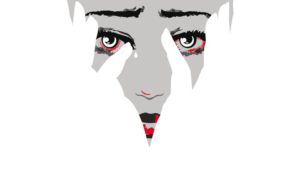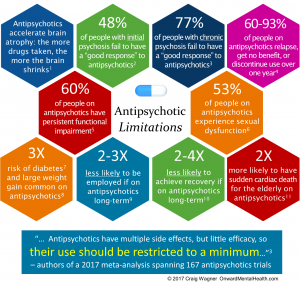Stories organize us, and “bad stories” organize us in destructive ways. In this post I will address one example: the story told about how skilled mental health professionals can distinguish between dissociative disorders, with their roots in trauma, and psychotic disorders, which are understood to be definitely illnesses of the brain.
Why do professionals attempt to make such a distinction? The idea is that people with dissociative disorders need to be offered caring and skillful therapy which addresses their traumatic past and their fragmented response to it, so they can reorganize in a more integrated way. It is thought that such a psychological approach would be useless for those with psychotic disorders, as their problems are understood to be based in their diseased brains, with drugs being required to control the malfunctions.
If professionals really could reliably distinguish those whose problems came from difficult experiences and who could be helped by therapy and self-understanding, from those whose problems were more organic and who could not be helped in a psychological way, then focusing on making such a distinction would be a useful approach. But if their faith in their ability to do this is really a delusion, then what they are really doing is defining everyone on the “psychotic” side of the distinction as being beyond human understanding and help, and so inflicting another blow on those already severely troubled.
It is well known that people dissociate when all of the person’s mind cannot bear facing what happened directly. Later, parts of the person that did not face the experience may be unable to integrate with the parts that did: each feels alien to the other.
It’s what happens next that may be crucial in separating those who will be recognized as having a dissociative disorder from those who will be seen as having a psychotic disorder.
If the person recognizes the “alien” parts of themselves as being just parts of themselves, even if they seem to be disturbing or even “different personalities,” then they have a good chance of seeing themselves, and of having professionals see them, as having PTSD or a dissociative disorder. But if they see the “alien” parts of themselves as being literally aliens, or demons, or CIA agents talking to them through a brain implant, then they will likely be diagnosed as psychotic.
It’s important to notice what’s happening here: it’s the person who feels more strongly alienated from parts of themselves who is likely to make the “psychotic” interpretation about what those parts are — and then it’s that person who will be seen by the mental health system as having a disorder that is understandable only as brain dysfunction.
We might imagine the following exchange:
Person: “I have an alien inside me.”
Mental health professional: “No, what you have inside you is a defective brain, this is brain pathology or illness.”
When we are alienated from someone, we may fail to cooperate with them and actually battle with them, but at least we notice they are a living being. When people are alienated from thoughts, feelings, and parts of themselves, or characters inside themselves, they may fail to work with those parts or integrate them into their identity, but at least they relate to those parts as something alive. What professionals do when they pathologize parts of people or their experiences is to dehumanize them, to see them not as something living that can be related to, but as something that should be exterminated. This is where the alienation becomes compounded.
What’s missing in the professional’s response is an acknowledgment that what the person may have inside them is a very human response to very difficult experiences, and the brain may be simply responding to those experiences. By failing to admit that possibility, recovery becomes more difficult. If the person accepts the professional’s explanation, they may feel no longer inhabited by an alien, but now they are inhabited by pathology, and one that can be expected to be lifelong and requiring lifelong efforts toward ongoing extermination.
Professionals vary of course in when they start seeing evidence of “brain pathology,” versus when they are open to seeing a problem as psychological.
- Some will still identify any report of voice hearing as evidence of brain pathology, with no consideration of the possibility that voices could be dissociative.
- Some imagine they can use certain criteria to distinguish “dissociative voices” from “psychotic voices” — even though research shows there is no reliable basis for making such a distinction.
- Some claim that if a voice is dissociative, then the person will be able to talk to it, while a person cannot talk to a psychotic voice.
The alternative hypothesis is that professionals are simply failing to recognize that alienation exists on a spectrum, and these professionals are mistaking differences in degree of alienation for a categorical distinction that does not exist.
It’s common for example for people to be told that dissociative voices are experienced as “inside” the person, while psychotic voices are experienced as “outside” the person. But these experiences are really on a spectrum, and, it turns out, a very tricky spectrum.
For the purposes of this discussion, let’s say that a person is just dissociative, and not psychotic, if they perceive all the voices they hear (that others don’t) as part of their larger self, while defining someone as “psychotic” if they perceive voices they hear as something other than themselves. (Looked at this way, being “psychotic” is not distinguished from a dissociative problem, but seen as a possible complication that might occur, or a further degree of alienation.)
The tricky issue is that many people who are just dissociative in the sense defined above, actually hear the voices of the other parts of themselves as though they were coming from outside of themselves, from somewhere else in the room for example. They may also “see” parts of themselves as outside of themselves, though they are aware this is just a mental experience and so they are not psychotic. Meanwhile, many people who are “psychotic” in the sense defined above, hear their voices or many of their voices as located inside themselves, though they believe it is not part of themselves — as in the case where they believe that a demon or brain implant has gotten inside of them.
This makes more sense if we think of multiple spectrums: there’s the spectrum of how much a person is alienated from a voice or how much they see it as not themselves, and then there is the spectrum of how much it seems at any given point to be physically inside themselves.
The idea that professionals can define voices as more “psychotic” if people find themselves unable to talk to them also ignores the possibility of a spectrum; it ignores the possibility that inability to talk may be another function of the degree of alienation. We all know, for example, that when people are feeling very alienated from fellow human beings, they often find they are unable to talk with them. Many of us find for example that we can’t talk with people who are too different politically — or even if we are willing to talk, those others will not talk to us!
People in the hearing voices movement, and therapists working with psychosis, commonly find at the outset that people cannot talk to their voices, but with some work, such talk becomes possible, and helpful.
This work is not seen as possible, however, when the person’s initial inability to talk to the voices, and inability to see the voices as part of themselves that can be related to, is interpreted as evidence that the voices are just brain pathology. There is a notion that “one cannot talk to a disease” and so the professional’s interpretation that the voice is brain pathology becomes part of the problem in communication, or compounds it.
I should point out that “dissociation,” like anxiety or depressed mood, is not entirely a bad thing. There are times it is helpful, and some degree of it is part of healthy human functioning. People in the hearing voices network point out that hearing voices — a particular kind of dissociative experience — can also be part of healthy human functioning, though people can also have various kinds of problems with these experiences. Some of those problems reach the level of what is called psychosis — being seriously “out of touch with reality” and/or severely disorganized. But these problems can all potentially be addressed and resolved, by helping people relate to what they are experiencing rather than pathologizing it.
There are now lots of people who have publicly described their journey from being quite truly lost in psychosis, and fully meeting the diagnostic criteria for “schizophrenia,” and who then, as they got more insight, shifted to having experiences that looked something more like a dissociative disorder, and then eventually shifted to not being “disordered” at all. Eleanor Longden is a well-known example. When she was fully “psychotic” she was fully convinced that her voices emanated from physically real beings outside of her who could harm her and her family if she did not obey their commands, and her reasoning process was so bad that at one point she was ready to drill holes into her head to get the voices out, with no insight into the fact she would likely kill herself in the process. Later, she came to recognize the voices as split-off parts of herself, and as she reconciled with those parts, she healed. She tells her story eloquently in her Ted talk and in more detail in this longer version.
I work as a therapist specializing in therapy for psychosis, and while I am not always successful, I have been fortunate enough to help people make similar journeys toward healing.
These are complex issues, and this post only touches on the subject. I have been working to make education on this subject more available, in particular in the form of my online course Working with Trauma, Dissociation, and Psychosis: CBT and Other Approaches to Understanding and Recovery, which comes with 6 CE credits for most US professionals.
on this subject more available, in particular in the form of my online course Working with Trauma, Dissociation, and Psychosis: CBT and Other Approaches to Understanding and Recovery, which comes with 6 CE credits for most US professionals.
In the bigger picture, alienation and dissociation is something that happens not just within people, but within and between social groups, tribes, nations, etc. Seeing the “alien other” as just something pathological, something to be exterminated, is not working very well. We need more attention to approaches that recognize the life and the validity in the alien other, and which help people and social groups assert their own needs while also finding ways to recognize and reconcile with the deeper needs of the other. There is reason for hope, so let’s do what we can to nurture the possibilities!




